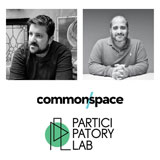Lecture by Commonspace (Thanos Andritsos, Dimitris Poulios) entitled Design - Participation - Sustainability: Between international debates and local experiences on 15/12/22 at 14:00 at room Γ.
Commonspace is a collaborative – interdisciplinary planning and design group that works since 2012. In 2015 was established as a Social Cooperative Enterprise under the name “CPD Creating Spaces” and in 2017 as a Worker Cooperative under its current name. The wide range of commonspace’s members and associates create a network of experts and scientists involved in Urban and Spatial planning and Environmental Management, combining research work and study projects.
Commonspace provides high quality services in the fields of Spatial Strategies, Architecture, Social Research, Urban and Environmental Design and Participatory Planning by creating/implementing innovative tools and processes. It seeks to be a link between citizens, social institutions and public authorities, a hub for the exchange of knowledge, ideas and practices among citizens, experts and decision-makers.
At the core of our approach and methodology is the promotion of participatory design at all scales and with a wide range of applications: from the co-design of buildings and public spaces to the co-decision making on spatial development and environmental protection. In 2020, it took the initiative to create Participatory LAB, “Laboratory of Spatial, Urban and Environmental Participatory Planning for Climate Change Adaptation”. Participatory LAB project aims to create an active, interdisciplinary community that studies, documents, learns, disseminates, and implements participatory planning processes for the climate change adaptation of cities.
Commonspace took its first steps a decade ago, while the effects of the crisis were becoming more and more severe, and the new "condition" of austerity was taking shape for the cities of Greece. Apart from decent access to our professions, the question of a different approach to the content of the design was raised. Which studies and projects are the most socially useful in a social crisis? This question illuminated a direction for the answer: The residents themselves. Those who can best judge what a city in crisis needs can only be those who experience it. So we turned to participatory planning, not as a "luxury" for the "good years" for places or populations that have solved fundamental survival issues, but as a necessity for "urgent times" for cities and social groups in crisis.
In the same decade, participation and sustainability have turned from alternative pursuits into a dominant discourse in all international policies and European and national strategies. This lecture will reflect between the international debate and local applications, between experimentation and institutionalization. In this attempt, we will combine theoretical approaches with professional experiences.

